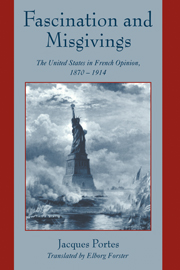Book contents
- Frontmatter
- Contents
- Preface
- Introduction
- Part I The United States as Exoticism
- Part II Models from the United States
- Part III The United States as Power
- 12 Immigration: Strength or Weakness?
- 13 Business
- 14 And Now, Imperialism
- 15 Is There a Culture in the United States?
- Conclusion
- Selective Bibliography
- Index
13 - Business
Published online by Cambridge University Press: 07 October 2009
- Frontmatter
- Contents
- Preface
- Introduction
- Part I The United States as Exoticism
- Part II Models from the United States
- Part III The United States as Power
- 12 Immigration: Strength or Weakness?
- 13 Business
- 14 And Now, Imperialism
- 15 Is There a Culture in the United States?
- Conclusion
- Selective Bibliography
- Index
Summary
The American naturally did business, just as Molière's Bourgeois Gentilhomme did prose; and it was said that
… business is … the triumph of America; any history, any description of the United States is also and above all the description of a colossal and unheard-of business, an agricultural, industrial, and commercial operation such as the world has never seen or dreamt of.
So pervasive was the role of economics that the French felt that the Americans conducted politics as they conducted business, that their newspapers were managed like vulgar factories for making fertilizer or shoes, that their food was produced by businesses without concern for anything but profitability. So deeply marked was American life with the seal of economic activity that the famous dollar quite naturally had become its symbol; this was indeed the “King Dollar,” the almost uncontested standard for measuring the value of people and things.
Such a state of affairs was bound to surprise a French opinion that had never known the absolute reign of the laws of economics and often distrusted the world of business, which it considered necessarily shady and inevitably suspect of graft and dangerous and useless speculation. One would think, therefore, that the French would have been particularly interested in the various sectors and the functioning of the American economy as a way to help them understand this strange behavior.
But this was not the case; interest in the American economy was always rather marginal and rarely spread beyond the specialized circles of administrators, businessmen, and economic journalists. Their strictly technical approach contributed little to the formation of French opinion.
- Type
- Chapter
- Information
- Fascination and MisgivingsThe United States in French Opinion, 1870–1914, pp. 358 - 388Publisher: Cambridge University PressPrint publication year: 2000



